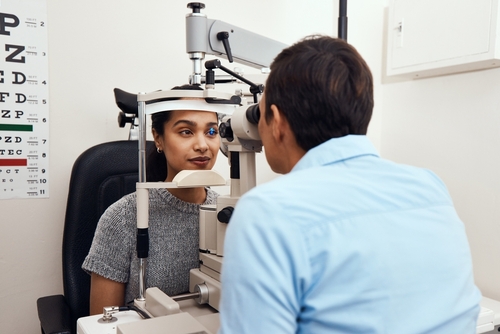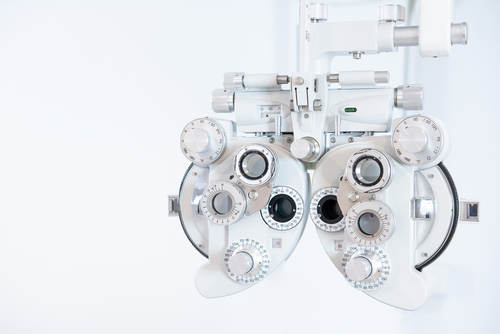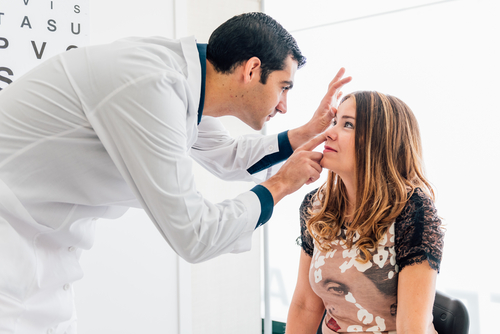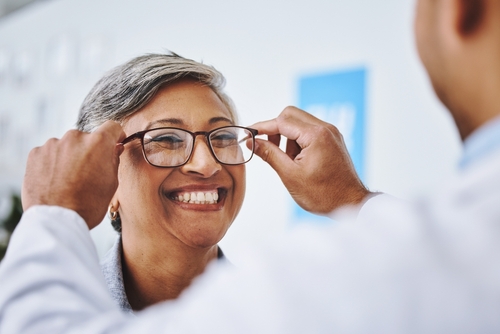What to Expect During an Eye Exam
August 18, 2023
Eye exams are crucial for maintaining your overall eye health, detecting potential vision problems, and ensuring you’re seeing as clearly as you can be. A comprehensive eye exam involves much more than simply checking your visual acuity or determining your prescription.
It is a thorough evaluation of the health and functionality of your eyes, encompassing a range of assessments and tests. Keep reading to find out what to expect during an eye exam!
How Should I Prepare for an Eye Exam?
At the start of your appointment, your eye doctor will discuss your personal and family history. They will ask if you have any vision complaints or have noticed any changes to your vision. 
It’s also important to inform your eye doctor of any medications you are taking because some types of medications can affect your eye health. Gathering this information in advance will help you be prepared for your eye exam.
You may also find it helpful to make a list of any concerns or questions, so you don't forget. It's important that you bring any prescription glasses or contact lenses with you to your eye exam.
Eye exams typically take an hour or two, so plan your schedule accordingly. During most routine eye exams, the eye doctor will use special eye drops to make your pupil bigger.
This helps them see the back of your eye more clearly and check its structures. After dilatation, your pupils may be sensitive to light, so be sure to bring some sunglasses.
What Types of Testing Will Be Done?
During your appointment, your eye doctor will evaluate the health of your eyes using several different methods. The combination of these provides a complete picture of the health of your eyes.
Vision Testing
They will test your visual acuity to assess the clarity and sharpness of your vision. This is where you will be asked to look at a chart with letters of different sizes.
This test helps determine how well a person can see objects from a certain distance. 
Refraction
If you have a refractive error like nearsightedness, farsightedness, astigmatism, or presbyopia and need glasses or contact lenses, your eye doctor will perform a refraction test determines your prescription.
During a refraction test, you will look through a phoropter, a machine containing different lens prescriptions. Your eye doctor will ask which of the two lens options helps you see better, ultimately pinpointing the exact prescription you need.
Pupil Testing
Your pupils are important structures that manage how much light reaches the retina at the back of your eyes. Your eye doctor will assess how well they are working by shining a light on them and gauging their reaction.
Retinal Exam
Your eye doctor may dilate your pupils to conduct a retinal exam. The retina is located at the back of the eye.
During this part of the eye exam, they look for any abnormalities or changes that may indicate a retinal condition.
Slit Lamp Exam
To better see the different components of your eye, a slit lamp may be used. This device is a special microscope that illuminates and enlarges different parts of your eye, such as the cornea, iris, and lens.
Eye Pressure
Eye pressure is a key indicator of your eye health. With a tonometry test, your eye doctor will measure your eye pressure to ensure it falls within normal levels.
Increased eye pressure can be a sign of glaucoma.

Visual Field Testing
A visual field test evaluates your central and peripheral vision. This is important because some conditions affect these areas of vision.
Peripheral vision loss can be a sign of glaucoma and optic nerve damage.
If you have an eye condition or your eye doctor suspects you may have one, more advanced testing may be performed. After their evaluation is complete, they will discuss their findings and any recommended treatment if needed.
How Often Should I Have My Eyes Examined?
How often you should have your eyes examined depends on a variety of individual factors. If you have an eye condition or a history of them in your family, your eye doctor may recommend more frequent exams. 
When you have an eye condition, such as glaucoma, cataracts, or macular degeneration, regular check-ups are typically needed to monitor its status. Certain health conditions may also increase how often you need to have your eyes examined.
For instance, if you have diabetes, hypertension, thyroid disease, Sjogren’s disease, or lupus, you may need to have your eyes checked more often. The reason for this is that these conditions can affect your eyes in various ways and increase the chances of developing an eye problem.
Your age also affects how often you should have your eyes examined. For those forty or older, your eye doctor may tell you to come in for an exam once a year. When you’re younger than forty, you may not need them as often.
Always follow your eye doctor’s suggestions for when you should schedule your next eye exam. They will consider your individual circumstances to determine the ideal timing needed to best support your eye health.
Is it time for you to have an eye exam? Schedule an appointment at Eyes of York in York, PA, today!



